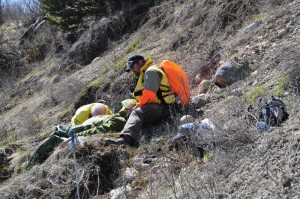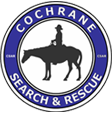 Volunteer SAR organizations like Cochrane SAR cannot initiate a search: the authorities call us and we respond. There are very good legal reasons for this system, so if you call us directly we will be sympathetic but you will get us into the field faster by calling the appropriate authorities, such as the police/ RCMP.
Volunteer SAR organizations like Cochrane SAR cannot initiate a search: the authorities call us and we respond. There are very good legal reasons for this system, so if you call us directly we will be sympathetic but you will get us into the field faster by calling the appropriate authorities, such as the police/ RCMP.
CSAR’s service area is primarily reflective of Cochrane, Canmore, Banff and Kananaskis RCMP Detachment boundaries. We will respond to searches outside of this area to the North, East and South if called in by our partner agencies. In addition, CSAR will always respond to the West of this map and usually alongside our SAR Partners.
View Search AreaInformation to gather
If you believe someone you know is missing, and before you phone the authorities, this is what you should do:
1. Determine if the person is really lost. Sometimes people change their plans or return from a trip without letting anyone know, check with friends and relatives for any information. If the missing person is a child, see section below for hints.
2. Gather information before you contact the authorities:
- the name of the person, including aliases;
- a physical description of the person (age, race, gender, height, weight, etc.);
- a description of any vehicles, clothing or equipment they would have with them, including their experience in the outdoors;
- where they were going, when they left, and what time they were supposed to be back;
- what you have done to locate them;
- any special concerns they may have (medical conditions, unfamiliarity with the area, car in poor repair, emotional concerns, lack of appropriate clothing, etc.). Don’t withhold information because it might be embarrassing as that one piece might give the search manager the additional clue they need.
Who to call?
With the above information in hand, phone 911 (in most parts of North America). If 911 does not work in your area then dial zero (0) and tell the operator that you need search and rescue. You will be connected with the right agency for your area.
And then …
Let the professionals handle it. This may be the hardest thing you ever do. Police and SAR procedures may seem like a waste of time when you want to run into the woods to look for a loved one, but following the system greatly reduces the chance that anything will be overlooked. Many valuable clues such as footprints have been destroyed by well-meaning friends and family trying to help in a search. Your most valuable role is as a source of information for the search managers.
Lost Children
A surprising number of children who were last seen in the house or yard are found either asleep or playing quietly. The best way to search is to pretend you are looking for something the size of a cat: look in bedding, piles of clothing, laundry hampers, cupboards, closets, under porches, under beds and in furniture. Children have been found in closed dresser drawers or hiding among boxes in the basement. Ask neighbours if they have seen the child, and ask them to check their houses, garden sheds and garages. Don’t forget to check the trunk of cars and any neighbourhood tree houses.
See the links page on this website for information on organizations like Child Find Canada, which specialize in looking for children who are missing rather than lost.
How long should you wait before calling for help?
There are no hard and fast rules about how long you should wait after you think a person is overdue before you call for help. For example, if you can’t find a child within an hour or so it is time to call for assistance. But an experienced camper who is 6 hours overdue from a 2-week hike might not be quite so worrisome. It depends on the people, how prepared they are, the weather, medical conditions, etc. But remember this: everyone in search and rescue would rather be called out and have the missing person show up five minutes later, than to be called out too late.
